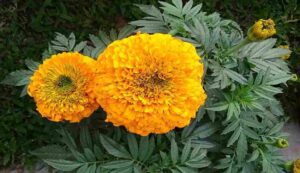Success Story: This farmer is earning huge profits by cultivating marigold flowers, know the method of cultivation
Success Story: Surendra Kumar, who lives in Rajasthan’s Sikar district, is one of the farmers who has not only overcome the constraints of traditional farming and embraced innovation, organicity, and technology to make their farms profitable but has also inspired other farmers in the area. On one hectare of his four hectares of land, he mostly cultivates marigold flowers (marigold yellow) organically. He cultivates traditional crops, including millet, guar, peanuts, and moong, on the remaining area.

He grows marigold flowers and sells products valued between Rs 1.50 lakh and Rs 1.80 lakh a month. He makes almost Rs 20 lakh in net profit from growing marigold flowers throughout the course of the year. From the overall revenue from all crops and flowers, he makes around Rs 30 lakh a year. Tell us about his success story in detail in such a scenario.
The transition from conventional to contemporary organic farming
About ten years ago, progressive farmer Surendra Kumar made his agricultural debut. Like other farmers, he first worked with conventional methods as well. However, the overuse of chemical pesticides and fertilizers was lowering land quality, decreasing productivity, and raising costs.
He made the decision to switch to organic farming four years ago in light of this circumstance. He realized that his choice was correct when the quality and quantity of the product improved, the requirement for irrigation dropped, and the health of his farm’s soil began to progressively improve.
The kind of marigold flower and its unique characteristics
The marigold flower kind that young farmer Surendra Kumar mostly cultivates is Marigold Yellow, often known as yellow marigold. This bloom is unique in that it produces continuously for six months. In other words, blooms are accessible for six months after the sapling is planted. In addition, its need is constant throughout the year, as it is necessary for all types of labor, including weddings, festivals, religious ceremonies, decorations, and havan-paath.
In May and October of each year, he plants the plants. By growing marigold flowers in two different seasons each year, he is able to generate a consistent income.
Utilizing organic ingredients and the results
In his work, Surendra Kumar employs Zydex’s organic products, such as Zytonic-M, Zytonic-Active, Zytonic Zinc, Zytonic Neem, Zytonic Mini Kit, and Zytonic Suraksha. The quality, immunity, and production capacity of flowers and other crops have all increased dramatically with regular usage of these organic products.
He claims that since the soil is more friable, it can retain more water and that the amount of water needed has decreased by half. For instance, he used to have to irrigate every other day, but now he only has to do it on the fourth day. This has also resulted in lower watering costs.
Drip irrigation is a modern irrigation system
Instead of using conventional irrigation techniques, progressive farmer Surendra Kumar has switched to a drip irrigation system. In addition to saving water, this technique improves the efficiency of fertilizers and nutrients by delivering water straight to the plant roots. They are producing more with fewer resources because of drip irrigation.
Market strategy and flower sales
The main marketplaces in Sikar and Jaipur are where Surendra Kumar sells his flowers. Every day, he brings 1.50 to 3 quintals of marigold flowers to the market.
The market’s festivals, supply, and demand all affect the cost of the same flowers. He has so far charged between Rs 80 and Rs 250 per quintal for his goods. Prices decrease when the market has more items and less demand, but he still makes a steady living from the ongoing need for flowers like marigolds.
Floriculture and other crops
In addition to marigolds, they grow chrysanthemums and jaffri in the winter, which are popular throughout wedding and festival seasons. In addition, they cultivate guar, millet, groundnuts, and moong. These crops provide them with extra revenue, and the agricultural cycle lasts all year round.
A motivational message for farmers
According to progressive farmer Surendra Kumar, farming is a discipline that requires knowledge and scientific thought in addition to hard effort. In addition to boosting revenue, organic farming safeguards the ecosystem, water, and soil. He claims that there are several long-term advantages for farmers that switch to organic farming.

